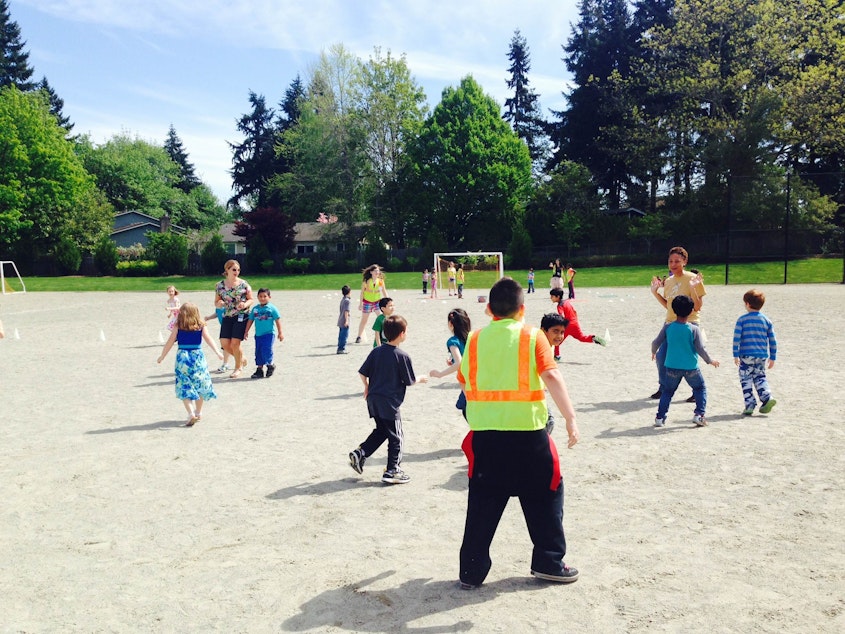Recess, Once Free Time, Gets An Overhaul

The recess for the youngest students at Ardmore Elementary School in Bellevue doesn’t look like your typical recess.
Big signs – and supervisors – direct students to organized games on different areas of the playground.
Each game has schoolwide rules, and each is supervised by a 4th or 5th grader wearing a neon yellow safety vest.
Some children run right to the game of their choice. Others appear indecisive.
On a recent morning, Betsy Norton, a Positive Behavior Intervention Specialist, approached a child who hadn't made up his mind.
"What are you going to play? Do you want to play freezer tag? Or soccer?" Norton asked.
Two years ago at Ardmore, recesses weren’t nearly as regimented.
"Initially recess was kind of a free-for-all," Principal Heather Sanchez said.
Away from the structure of the classroom, a lot of students weren’t getting along on the playground, she said.
"We would see issues around verbal conflict between kids, sometimes physical conflict between kids, and some kids who would just sort of opt out of recess," Sanchez said.
To deal with problems like this, Bellevue School District did what a growing number of schools around the country have done, and hired a national organization called Playworks to make-over recesses at the district’s highest-poverty elementary schools.
Playworks has trained several dozen schools in Washington how to turn recess from the traditional free time into an organized activity period.
Sanchez said it's brought order to Ardmore's recesses.
"We have a recess map, where we have different zones that have different structured games, and the games rotate. And we have a game of the week. So now, when the children go out to recess, they know what’s going on where, and they have structured choices," Sanchez said.
Playworks national trainer Kristina Walden said the program creates safe and inclusive playgrounds where every student is welcome in every game.
No more big kids dominating the tetherball court, for instance.
And when there’s a dispute over whether the ball was in or out, or who goes first, Walden said students know how to resolve it.
To resolve conflicts, students use a rock-paper-scissors style tool.
“We really not only give our students this as a tool to have fun, but really for them to carry with them throughout their lives so they can look for ways to resolve conflicts in positive ways," Walden said.
After two years of Playworks recess, Sanchez said more kids are active during recess, and the number of playground discipline problems, like bullying, has been cut in half.
"It’s retaining the spirit of recess, and the purpose of that is everybody needs a break to get up and move around," Sanchez said. "But it’s minimizing some of the unfortunate byproducts of that in terms of student disagreement and conflict."
Right now only kindergarten and first-grade students have Playworks recesses.
Second-graders Sienna Jarrard and Jia Bector had Playworks recess last year, and old-fashioned, free-choice recess this year.
Sienna and Jia agreed that their ideal recess schedule would be a hybrid of structured and unstructured.
"I would have Playworks maybe on Wednesdays and like Thursdays because then you get a chance to play every game,” Jia said.
"Some days you just might want to play on something else and not always play in a game," Sienna said.
Jia nodded. "So you get a chance to play with your friends, and you get a chance to play Playworks games, and it would be super-fun," she said.
"It’s funny, I mean, they’re prescient. I think that’s exactly the right approach, because you do have competing desires," said Dr. Dimitri Christakis, who directs the Center for Child Health, Behavior and Development at Seattle Children’s.
Structured recess has its advantages, Christakis said, like getting more kids moving on the playground. "And that may be one of the biggest benefits because we know from many studies, including studies we’ve done here, that simply being outside at recess doesn’t lead to a lot of increased physical activity," he said.
Christakis said that few children in the U.S. today get the hour of moderate-to-vigorous physical activity that’s recommended by many groups, including the American Academy of Pediatrics.
On the other hand, he said, this kind of regimented recess doesn’t let students resolve their differences organically, without close supervision.
"While I think it’s good and convenient that disagreements are settled with rock-paper-scissors, that isn’t what happens in the real world," Christakis said. "And while conflict isn’t a good thing, learning ways to negotiate conflict in the real world is a skill that children do need to learn, and it typically is learned on the playground.
Christakis said that structured recess also takes away a precious commodity for many kids: free time.
For their own games, or imaginative play, or just talking, or taking in nature.
"I think we run the risk of overprogramming our children in every arena today. So much of their time is structured. So much of their physical activity is structured. And I think there is at least a potential downside for that," Christakis said.
As a Playworks recess began at Ardmore, two young boys hadn’t chosen a game.
Instead, they stood on the sidelines, gazing up at the sky.
Norton tried to hustle them to a game.
"You could play soccer, or they have another game over here, with Patty," Norton said. "What are you going to go play? Make a decision! Recess goes fast!"
One of the boys looked at her and smiled.
“We’re just looking at the clouds," he said.
The three-part radio series No Time For Play examines how schools in the Seattle area are increasingly limiting kids’ physical activity and play times. It was reported by Ann Dornfeld and edited by Carol Smith.
Seattle-Area Kids Don’t Get Enough P.E., But Who Is Keeping Track?

